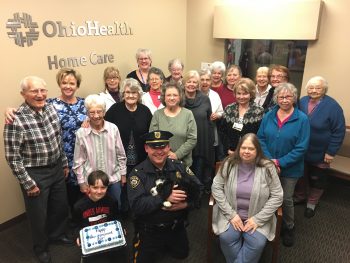With kindness and compassion, a group of dedicated local volunteers supports those in hospice care. While many people fear death and dying, these local volunteers make sure patients and their families are not alone during this difficult time.
Several hours a week, until the COVID-19 pandemic, dozens of local volunteers from their 60s to their 90s brought smiles to hospice patients. They listened, played games, and helped with errands or writing letters. The volunteers provide critical support for caregivers.
“I try to encourage the caregivers to use the volunteers so they can go to the store, get their hair done, and take a break,” said Theresa Hunt, Hospice Volunteer Coordinator for OhioHealth Hospice in Marion. “These volunteers provide companionship and emotional support. That’s not just for the patient. It’s also for the caregivers and their families.”

A personal experience with a loved one in hospice inspires many volunteers. Widows and widowers join after finding support during the death of a spouse. Ethel Cook started volunteering after her aunt was in hospice care.
“Her children just raved about the good treatment and how wonderful the nurses and everything were. I was at an age where I wanted to volunteer,” Cook said.
Cook used her love of garage sales to raise money. The first year, she raised $1,000 in two garage sales and donated it to the Marion General Hospital Hospice. Other volunteers joined and hosted four garage sales in Marion Meadows twice a year. One year, with matching funds, they raised $30,000. In 20 years, these hardworking volunteers have raised well over $100,000 for hospice. Funds go to help patients with needs like sheets for a hospital bed or gas cards for volunteers who have a significant drive to visit a patient.
Volunteers serve in rotation to make sure those who are dying are not alone in their final hours, especially those patients who do not have family or friends nearby.
“I believe the compassion that our volunteers have for our patients is just remarkable. They never turn down an assignment. They are the first ones to step up if we need someone,” Hunt said.
The secret to supporting someone in their final hours is simple, Cook said.
“I hear people say: ‘I can’t be with someone who is dying.’ Well, yes you can. It is a beautiful thing. The patients are so appreciative. It’s not about what you say. It’s about your presence. Just be there. When they’re dying, they’re not talking, but they know you are there. Just be yourself,” Cook shared. “Most people go very peacefully.”
Joyce Butterman coordinated the hospice volunteers when Cook started. Later, when Butterman’s mother was in hospice, Cook was one of the volunteers to care for her.
“She was very calming. She would hold her hand,” Butterman said. “Ethel is special. She loves the Lord and whatever she does is serving God.”
While some patients are only in hospice for a short time, others are in hospice for months. Some improve and leave hospice for a time. Volunteers build friendships with these patients and their families over months or years.
“I was assigned to a patient with Alzheimer’s. She was the most beautiful soul. She was so positive. I thought: if I ever end up in a nursing home, I would like to be like her,” Cook said. “You meet some lovely, lovely people.”
While taking time to focus on those at the end of their lives, the volunteers have also learned important lessons about living.
“Don’t have any unfinished business. Make peace with everyone. Forgiveness is such a huge part of life if you’re going to have relationships of any kind,” Cook said. “It’s all about relationships.”
Cook finds her faith to be a large part of her volunteer mission.
“Life is about relationships: relationships with God and relationships with each other. It’s rewarding because you feel like you are doing something important,” Cook said.
Cook treasures her friendships with other volunteers. They met monthly until the pandemic for training and learned about local services, including those from the local police department. All of the volunteers undergo background checks and follow HIPPA regulations, and they do not provide direct care. During this pandemic, volunteers work in the office or run errands but do not meet with patients directly. These volunteers look forward to resuming home visits once it is safe to do so.


















